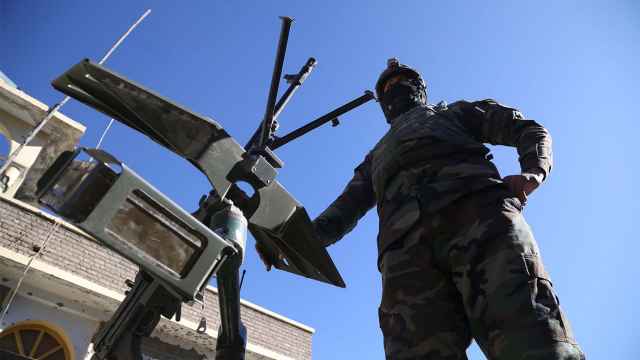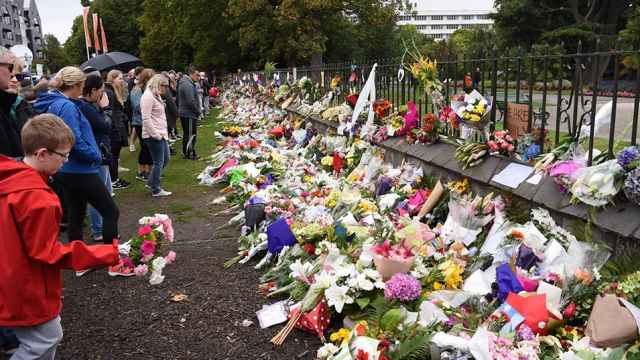A good crisis should never go to waste. It’s a political cliche, but even so, Moscow’s eager appropriation of the Manchester bomb attack to restart calls for counter-terrorism cooperation stands out for its tastelessness.
The irony is that while the Kremlin is wrong on almost every one of its talking points, it may be in the West’s advantage at least to see what Moscow is offering.
For a country that – rightly – felt its own terrorist tragedy in St. Petersburg in April was neglected by the West, it clearly felt no need to try and occupy the moral higher ground after Manchester.
Instead, a strategic decision was clearly made to exploit the attack. Medvedev’s tweet of condolence was relatively restrained: “The heinous act of terror took the lives of children and adults in Manchester,” adding “The global community must unite against terrorism.”
It is not as though there is particular disagreement within the global community as to whether it is pro or anti-terrorism. Rather, Moscow’s hope is to use this to undermine attempts to isolate Russia diplomatically.
Vladimir Putin made it clear in his message to British Prime Minister Theresa May. He affirmed Russia’s “readiness to build anti-terrorist cooperation with our British partners, both on a bilateral basis and within the framework of broader international efforts.”
The bluntest statement, though, came from Viktor Ozerov, chair of the Federation Council’s Defence Committee, who told RIA-Novosti that “unfortunately, what happened in Manchester was a lesson to the British intelligence services that without the help of other countries, their work will fail.”
Since 2014, Moscow has been trying to use the prospect of Russian assistance in the struggle against terrorism as a lure to persuade the West to relax its tough line following the seizure of Crimea. This was a large part of the reason why a career Federal Security Service (FSB) officer, Oleg Syromolotov, was given a brand new position in 2015 — deputy foreign minister for anti-terrorism issues.
The West may have to grit its teeth and talk to the FSB — the same organisation committed to destabilising Ukraine
Not all cooperation ended, but it has been limited and confined largely to technical liaison work. When FSB director Alexander Bortnikov attended a counter-terrorism event in Washington in 2015, it stirred controversy but almost no policy progress — given that he was on the European sanctions list and a prime mover behind the Crimean annexation.
On one level, the Kremlin’s evident eagerness to engage in counter-terrorism cooperation is reason enough to be wary. It is hardly known for its altruism. Although Moscow was prompt and helpful after 9/11, there was an implicit quid pro quo that not least saw some of their more brutal tactics in Chechnya overlooked. Greater cooperation today, especially in any “framework of broader international efforts,” would inevitably be used to excuse atrocities in Syria and as a lever to open wider cracks in any walls being built around Moscow.
Besides, intelligence-sharing is always transactional, curated, and revealing. Transactional in that the Russians would expect at least as much in return as they offer. Curated in that, if past experience is anything to go by, they would share information that helps paint the picture they want to West to see, probably identifying all anti-Russian nationalists in the North Caucasus as terrorists, for example. Revealing, in that from the areas of Western interest, the Russians will be divining our strengths, weaknesses, and preoccupations.
But how useful will Russian cooperation be? The St. Petersburg bomb highlighted their lack of capacity confronting Central Asian jihadists. And while they do have more in the North Caucasus, that is with the exception of the Boston marathon bombers, not where primary threats for the West will appear. The Manchester bomber was reportedly a British citizen of Libyan origin — what could Moscow have offered?
With little likelihood that the security gains would outweigh the diplomatic costs, the immediate logic would suggest keeping the counter-terrorism relationship to its present, limited form. And yet, there may be a wider, wiser reason not to discount these self-interested overtures.
There can and will be no substantive improvement in relations between Russia and the West so long as Putin remains in the Kremlin.
His ability to reinvent himself appears spent. His determination to see Western plots everywhere seem sincere. His 19th-century brand of “might makes right” geopolitics are still incompatible with Western values and the fundamental principles of the present global system.
If there can be no grand rapprochement, there can at least be a limited detente, repeated attempts to usher Russia back into the international system through myriad small gestures. Greater counter-terrorism cooperation may not do much for Western security, but nor will it harm it.
The West may have to grit its teeth and talk to the FSB, the same organization committed to destabilizing Ukraine, subverting the West and harassing opposition figures at home. It already does much the same with the spooks of other unpleasant regimes.
At the same time, the West can be looking ahead — to a Russia after Putin. Through this initiative, it could open channels with today’s rising FSB officers, who may be tomorrow’s power brokers. It could also help to undermine the regime’s claims that the West is implacably hostile to the Russian people.
It could be seen as expedient to ignore Russia’s overtures, given its obvious self-interest and the tone-deaf way it seeks to exploit the Manchester tragedy. But there may be more to gain than lose in cautiously – suspiciously – calling their bluff and seeing what they have to offer.
Mark Galeotti is a senior researcher at the Institute of International Relations Prague and heads its Centre for European Security.
A Message from The Moscow Times:
Dear readers,
We are facing unprecedented challenges. Russia's Prosecutor General's Office has designated The Moscow Times as an "undesirable" organization, criminalizing our work and putting our staff at risk of prosecution. This follows our earlier unjust labeling as a "foreign agent."
These actions are direct attempts to silence independent journalism in Russia. The authorities claim our work "discredits the decisions of the Russian leadership." We see things differently: we strive to provide accurate, unbiased reporting on Russia.
We, the journalists of The Moscow Times, refuse to be silenced. But to continue our work, we need your help.
Your support, no matter how small, makes a world of difference. If you can, please support us monthly starting from just $2. It's quick to set up, and every contribution makes a significant impact.
By supporting The Moscow Times, you're defending open, independent journalism in the face of repression. Thank you for standing with us.
Remind me later.








